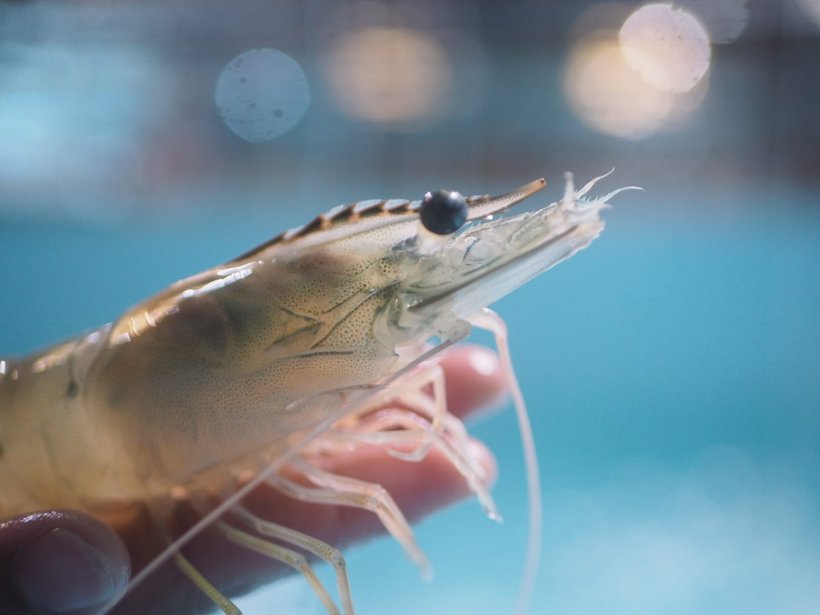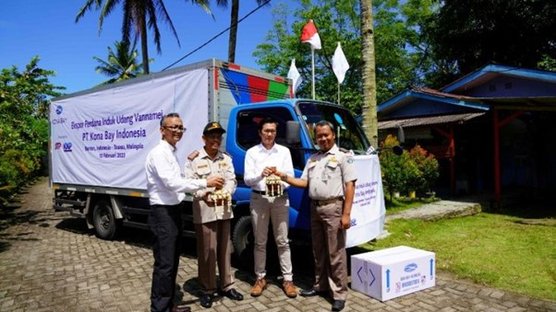
Published on Nov. 10, 2023
Biosecurity highlight: How do we protect our shrimp?
Biosecurity is a crucial focus in the operation of our shrimp breeding facilities. As the global demand for shrimp continues to grow, our customers and the entire value chain depend on high biosecurity standards to protect farmers and their shrimp from damaging diseases.
Biosecurity protocols include a range of preventive measures. They are designed to mitigate the risk of disease outbreaks and protect the genetic integrity of shrimp stocks.
Our Nucleus Breeding Center, located in Waimea, on the island of Kauai, Hawaii, is the nerve center of our Kona Bay global operations. At every stage of the process in this facility, we maintain high biosecurity standards to protect our breeding stock from harmful diseases.
Biosecurity practices
To protect our breeding stock from harmful pathogens, our biosecurity program manages the movement of people, equipment, materials, feed, and water.
Kona Bay strictly follows all best management practices to enforce biosecurity. These include dedicated staff and equipment for each individual module or unit (line development vs commercial production). Each facility also has strict rules for staff not to travel between the Nucleous Breeding Center and farm without proper showering and disinfection procedures. All tanks, equipment and supplies are disinfected after use with regular dry-outs scheduled to mitigate any possibilty of cross contamination between production runs.
Additionally, all our operations work with ‘firebreaks’ to prevent vertical or horizontal transmission of pathogens. This applies for firebreaks to the outside environment as well as within our compounds.
Regular monitoring
To continually monitor our facility, we work with The University of Arizona (UAZ) – Aquaculture Pathology Laboratory, which is a USDA approved, OIE reference laboratory. An accredited USDA Vet routinely collects/submits samples to UAZ for fourteen listed pathogens/diseases. USDA stringently monitors and evaluates Kona Bay’s health status and biosecurity procedures. In addition to USDA, Kona Bay is also routinely monitored by the Hawaii State Dept. of Aquaculture (HDOA) under their Shrimp Health Certification Program (SHCP), which registers shrimp stocks and facilities as Specific Pathogen Free (SPF). HDOA issues certificates of origin and uses UAZ testing reports to issue disease status certificates for each consignment.
From 2006 until today, our facilities have tested negative, and we trust this rigorous testing scheme will continue to certify and guarantee the highest quality of broodstock for our customers.
Security of supply
Before shipment, our logistics team is responsible for preparing specific quality and health certification documents, based on each country’s requirements. This protects our customers from the risk of diseases and ensures security of supply in maintaining their operations.
In conclusion, biosecurity measures are essential in the supply of high-quality shrimp genetics. By implementing robust protocols, such as controlled access, quarantine procedures, and regular health monitoring, we can minimize the risk of disease outbreaks and protect the health and sustainability of the shrimp industry.

Kona Bay India BMC is going to be the cornerstone of responsible and sustainable shrimp aquaculture in India. Our isolated location with most modern state-of-the-art facility and stringent biosecurity measures in place would ensure that the genetic integrity and health of broodstock is safeguarded and enhanced in local conditions, protecting the industry from disease outbreaks and promoting long-term success.

